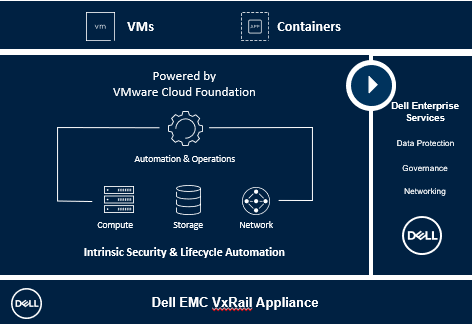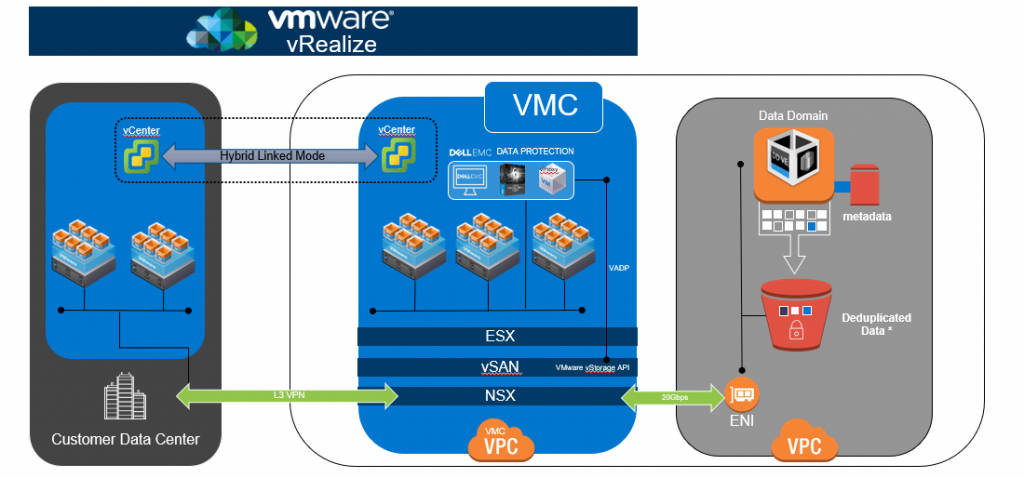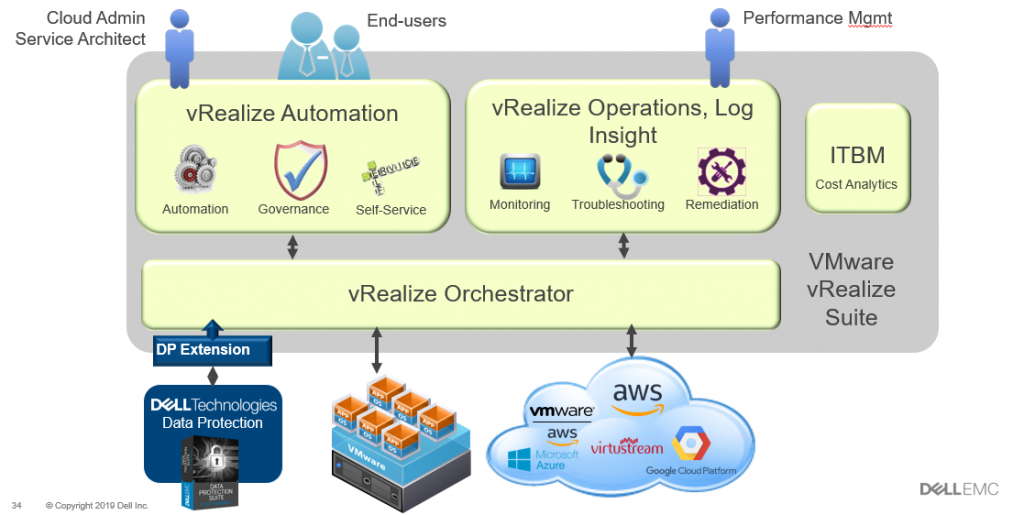Modern business applications require flexibility, enabled by a hybrid cloud that delivers consistent infrastructure and operations. Customers view hybrid clouds as a way to gain flexibility and speed to respond to changing business needs, accelerate innovation, and align costs to business requirements by managing upfront expenses, operational support, and TCO. However, if an organization wants to seamlessly harness the power of the hybrid cloud in an integrated manner, there are several requirements that need to be met. Some of these challenges include: operational inconsistencies, different skillsets & tools, disparate management tools and security controls, inconsistent application SLAs, and incompatible machine formats.
Sonali Desai, Product Marketing Manager from VMware, Ken Smith Sr., Product Marketing Manager from VMware and Kenon Ewing, Systems Engineer for Data Protection from Dell EMC, recently presented about moving to the cloud and maximizing customers’ VMware investment with Dell EMC Data Protection.
As two powerhouses and leaders in private and public cloud, VMware and Amazon Web Services (AWS) jointly deliver a truly differentiated and compelling engineered solution to customers – the VMware Cloud™ on AWS. Delivered, sold, and supported by VMware and its partners as an on-demand service, VMware Cloud™ on AWS integrates VMware’s entire enterprise-class software-defined data center (SDDC) and optimizes it to run on dedicated elastic Amazon EC2 bare-metal infrastructure that is fully integrated as part of the AWS Cloud. VMware Cloud™ on AWS enables organizations to take advantage of a rich set of benefits with rapid time to value including: consistency and familiarity of VMware technologies, easy workload portability, seamless access to native AWS services, and container and VM support. With the same architecture and operational experience on-premises and in the cloud, IT teams can now accelerate their cloud migration in the simplest, fastest, and lowest risk way with compelling TCO from use of the AWS and VMware hybrid cloud experience.
 However, there are certain obstacles preventing companies from going to the cloud, requiring companies to maintain their on-premises infrastructure. Data sovereignty issues, including regulatory and privacy requirements, sensitive data located on-premises, custom security standards, and need to prove compliance to auditors prevent organizations from moving to the cloud. Additionally, workload and data proximity issues such as low data latency requirements, workloads with local data processing, and data center workloads that are tightly integrated with backend systems require data to remain on-premises. Even some customers who have moved some of their data into the cloud feel that they do not have the same transparency and control over their data and struggle to keep control over their critical workloads, leverage existing IT environments, and maximize the value of existing talent and processes.
However, there are certain obstacles preventing companies from going to the cloud, requiring companies to maintain their on-premises infrastructure. Data sovereignty issues, including regulatory and privacy requirements, sensitive data located on-premises, custom security standards, and need to prove compliance to auditors prevent organizations from moving to the cloud. Additionally, workload and data proximity issues such as low data latency requirements, workloads with local data processing, and data center workloads that are tightly integrated with backend systems require data to remain on-premises. Even some customers who have moved some of their data into the cloud feel that they do not have the same transparency and control over their data and struggle to keep control over their critical workloads, leverage existing IT environments, and maximize the value of existing talent and processes.
To combat these challenges, Dell EMC and VMware co-engineered and delivered the VMware Cloud™ on Dell EMC: cloud infrastructure delivered as a service on-premises, fully managed by VMware. VMware Cloud™ on Dell EMC is built on Dell EMC VxRail infrastructure, and runs on the VMware’s SDDC to handle compute, storage and networking processing. This all-inclusive service also offers a hybrid control plane to provision and monitor resources as well as a monthly subscription-based pricing model. VMware Cloud™ on Dell EMC offers customers support for multiple use cases such as: data center modernization, switch from CapEx to OpEx financial models, and hardware refresh. Another use case is data latency and sovereignty, where the infrastructure stays onsite and can be employed by companies with low data latency requirements, data sovereignty requirements, and data governance and security. Application modernization, including development agility, Kubernetes, and traditional application deployments are all instances where customers can utilize VMware Cloud™ on Dell EMC.
Whether customers’ data and applications reside on-premises or are moving into the public cloud, Dell EMC provides cloud protection across the protection portfolio. Dell EMC’s software-defined data management (SDDM) empowers organizations to simplify and automate their data protection. Dell EMC offers data availability, data management, and data analytics on a single SDDM platform, enabling customers to choose their consumption model between multi-dimensional appliances, software, or SaaS.
Dell EMC’s SDDM offers integration, which helps drive the value of data protection and enables ease of consumption. Specifically, the native application UI integration streamlines the data protection process with out-of-the-box supported integrations. Infrastructure managers provide tenant control, including governance, compliance, and legacy application protection. There are multiple form factor deployment options that are cost-effective for organizations including software defined, public and private cloud, appliance, and IoT/edge. Additionally, application admins can manage data protection through native interfaces such as vSphere, Oracle and SQL databases, cloud automation interfaces (REST), and Kubernetes.
Dell EMC data protection supports four use cases today with our cloud data protection strategy: long-term retention, disaster recovery, backup to the cloud, and  hybrid/cloud backup. Dell EMC is a trusted data protection provider, providing comprehensive coverage, flexibility, and powerful architecture, resulting in reduced infrastructure costs and simply powerful data protection.
hybrid/cloud backup. Dell EMC is a trusted data protection provider, providing comprehensive coverage, flexibility, and powerful architecture, resulting in reduced infrastructure costs and simply powerful data protection.
Dell EMC’s data protection automation provides companies with an easy and seamless way to ensure their data is always protected. Specifically, infrastructure automation is attribute-based inclusion and exclusion, where IT admins can set rules to be used for VM discovery and inclusion, as well as flexible and powerful REGEX matching. It can be auto deployed by either SDDC deployer (auto deploy backup, target and join vSphere), auto deploy proxy data movers, and auto deploy in AWS or other marketplaces. Additionally, Dell EMC offers orchestration automation to move data directly from the VMs to the intended storage target, both on-premises and in the cloud. Dell EMC’s data protection solution is Networker-based, comprised of workflows that enhance the existing catalog with Networker data protection provisioning and job status checking tasks. Using vRealize Orchestrator, Dell EMC’s data protection solution are easily integrated into the VM environment, ensuring simplicity and ease-of-use in a familiar UI environment.
 The data protection approaches discussed in the webinar provide customers with the performance and simplicity that they need to address the operational and compliance requirements for their hybrid cloud environments. Organizations see hybrid cloud capabilities as a combination of data center, public cloud, and edge infrastructure. Customers benefit when their data center integrates and works seamlessly with their public cloud and edge infrastructure while utilizing their existing teams, skillsets, tools, and processes. With VMware, Dell EMC offers the full spectrum of data protection solutions for any cloud environment. Learn more.
The data protection approaches discussed in the webinar provide customers with the performance and simplicity that they need to address the operational and compliance requirements for their hybrid cloud environments. Organizations see hybrid cloud capabilities as a combination of data center, public cloud, and edge infrastructure. Customers benefit when their data center integrates and works seamlessly with their public cloud and edge infrastructure while utilizing their existing teams, skillsets, tools, and processes. With VMware, Dell EMC offers the full spectrum of data protection solutions for any cloud environment. Learn more.
Additional Resources:
Watch an on-demand recording of the webinar
Learn about Moving Disaster Recovery to the Cloud – When Does it Make Sense?
Learn how Dell EMC and VMware Simplify, Automate, and Protect your Organization
Learn more about Dell EMC VxRail Hyperconverged Infrastructure
